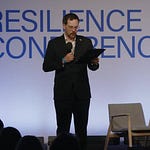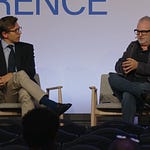At this year’s Resilience Conference, Plural partners Khaled Heloui and Sten Tamkivi opened with a clear statement of purpose about Europe’s early-stage gap and why defence is top of mind for these Northern European investors.
“Plural is our answer to the problem that we saw as founders and operators in Europe is that there are not enough institutional investors in the early stage,” said Tamkivi, adding that the team raised two funds of 800 million euros to back ambitious companies with capital and operating help. Their mission is simple.
“We’re going after the most ambitious companies around Europe to back them not to just money, but also help them build and scale the companies. We we’re all basically entrepreneurs,” said Heloui.
They framed defence and sovereignty as necessary work, not a marketing theme.
“If you look at what are the things that Europe needs to fix, what are the things with the biggest GDP level impact that we can tackle, then then you get to a list of things like defense and space and sovereignty and robotics and AI and so forth,” said Tamtivi. “Interestingly, we we started investing in defense before starting Plural.”
Geography and politics shaped their sense of urgency.
“If you look at the map of Europe there’s like 100 million living on the border of Russia that do not need an explanation about is this is urgent, is this important, do we have time, should we move, should we do something maybe?” asked Tamtivi. The policy shift they want is risk acceptance in procurement.
“The problem is the biggest risk we can take right now is not taking risks,” he said.
The partners called for a “single door” for founders in the EU who want to offer technology to defence organizations, thereby allowing for faster procurement and innovation. They contrasted this with an older model where manufacturers had unlimited time and nearly unlimited budgets — and rarely anything to show for it it.
“Hey, you’re two years, 10 years late with a fighter jet, a few billion over budget, that’s fine,” joked Heloui.
“It is critical that they start having a shot at meaningful procurement contracts,” said Tamkivi. “Otherwise, this industry is just going to keep repeating the cycle of the last 20 years, and we’re still going to have to rely on other countries basically to defend ourselves.”
The ceiling, they said, is not talent or seed capital.
“Europe doesn’t have a problem with supply of talent, we don’t have a problem with startup creation,” said Tamviki. He closed by arguing that the real test is scaling and the public market path.
“We feel at Plural that the thing is about how do we scale the winners way bigger than anybody dreamt of.”









